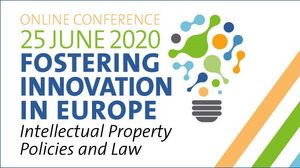Notwithstanding the difficulties brought about by the Covid-19 pandemic, the European Joint Doctorate project of the EIPIN (European Intellectual Property Institutes Network) Innovation Society remains committed to pursuing its main objective: supporting high-quality doctoral research on the role of intellectual property (IP) as a complex adaptive system in innovation. At the online conference “Fostering Innovation in Europe - Intellectual Property Policies and Law” on 25 June all 14 Early Stage Researchers (ESRs) who are currently finalising their doctoral theses had the opportunity to present their research outcomes. In organising the event, EIPIN built on the active support of the Partner Organisation European Union Intellectual Property Office (EUIPO) in Alicante. The Office also acted as the official host of the conference.
As the Max Planck Institute for Innovation and Competition is a supporting institution of the EIPIN Innovation Society project, four representatives of the Institute actively took part in the event. Professor Josef Drexl, Managing Director at the Institute, moderated the Panel “Intellectual Property as a Complex Adaptive System” (Panel 1). Together with the ESRs, he discussed the relationship between IP rights and innovation stressing the tension between IP reward and access as the true innovation driver even in the foremost technological fields such as Artificial Intelligence. Furthermore, the three ESRs Niccolò Galli, Vicente Zafrilla Diaz-Marta and Letizia Tomada, whose doctoral theses are primarily supervised within the Institute, presented their research results during the conference.
The research results at a glance
During Panel 1 Niccolò Galli highlighted his research findings on the interplay between patent aggregation, innovation and EU competition law. Abandoning pejorative monikers such as patent trolling, he advocated for a conduct-based redefinition of patent aggregation as the building of ICT patent portfolios for subsequent non-manufacturing use. Based on such a redefinition he advanced an analytical framework to assess the possible innovation effects of patent aggregation activities within competition law analysis.
During the Panel “Governance of Production and Technologies” (Panel 2), Vicente Zafrilla Diaz-Marta focused his presentation on a very specific – and workable – proposal to prevent over- and underdisclosure of standard essential patents (SEPs) in the framework of standard developing organisations. His proposal builds on the aims of the disclosure system – primarily to ensure access of new market participants and secondarily to inform implementers for licencing purposes. It balances the incentives and dynamics that might encourage SEP holders to an under- or overdeclare SEPs or dissuade them from engaging in such behaviour.
During the Panel “Adjudication, Justice and Enforcement” (Panel 3), Letizia Tomada presented a part of her research findings concerning the implications of the establishment of the Unified Patent Court (UPC) for innovation of start-ups. She analysed certain UPC features that tend to favour strong established businesses over more financially constrained start-ups. The discussion focused on the lack of proximity to the litigation venue and the territorial scope of jurisdiction. Lastly, her presentation envisaged changes to the UPC Agreement to mitigate the existing imbalances.
Further information on the doctoral programme is available at the EIPIN-Innovation Society website.
This project has received funding from the European Union's Horizon 2020 research and innovation programme under the Marie Skłodowska-Curie grant agreement no 721 733.

